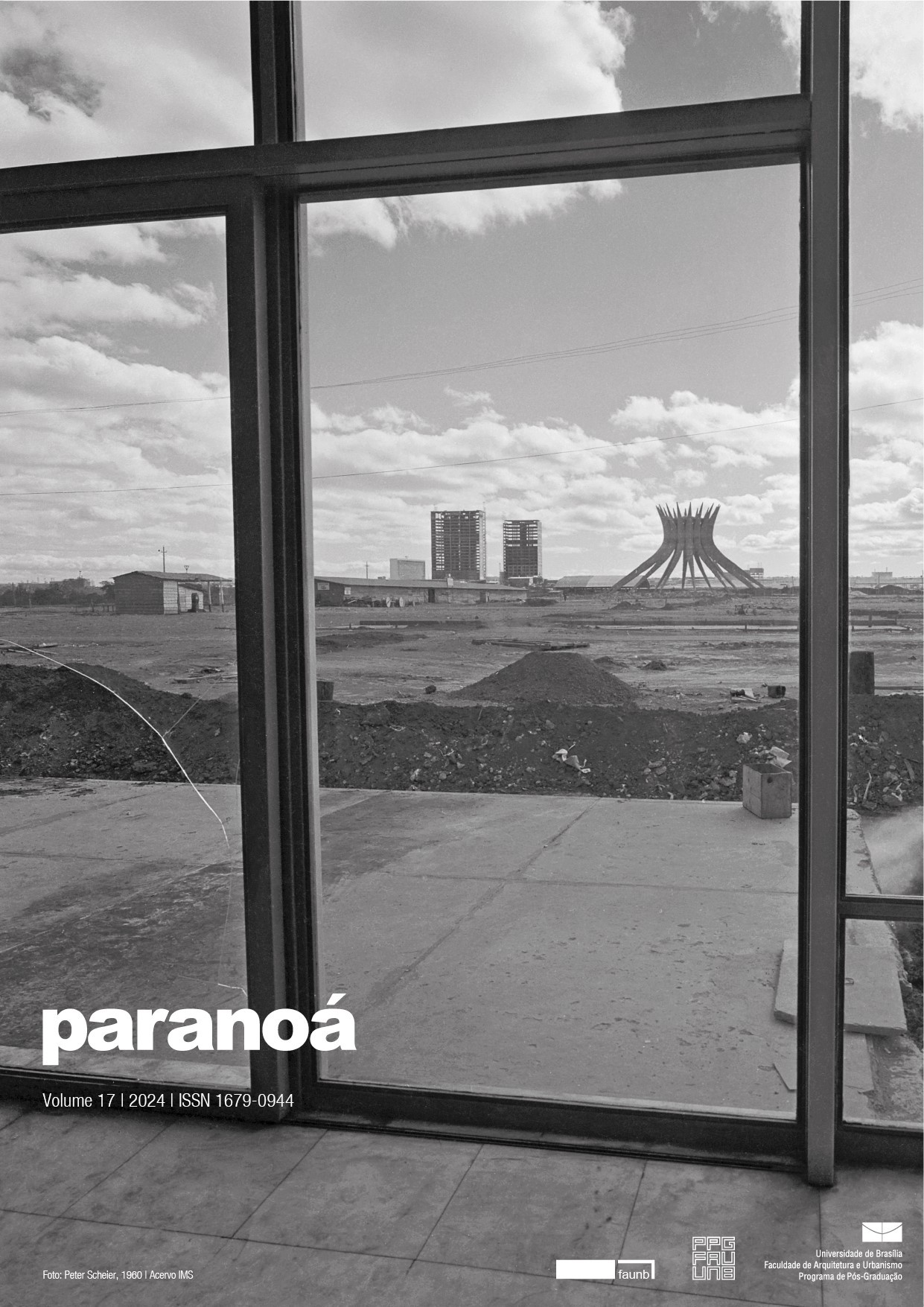La urbanística de Lucio Costa en la revisión de lo moderno
el proyecto de la Capital de Nigeria y su relación con Brasilia
DOI:
https://doi.org/10.18830/1679-09442024v17e45868Palabras clave:
Capital de Nigeria, Lucio Costa, Urbanismo, Moderno, PosmodernoResumen
A partir de la década de 1950, una revisión crítica comenzó a problematizar los conceptos urbanos modernos, provocando un cambio de situación al incorporar modelos abiertos de variadas expresiones urbanas al movimiento racionalista. Cuestiones como la preexistencia ambiental y topográfica, la arquitectura vernácula, la expresividad de las formas arquitectónicas orgánicas y escultóricas, la participación del destinatario y otros factores prevalecieron en metodologías urbanas conducentes a cambios formales. El análisis del diseño urbano de la capital de Nigeria realizado por el arquitecto Lucio Costa, realizado en 1976, pretende evaluar la propuesta dentro del debate de la revisión del movimiento moderno. Inicialmente, el artículo presenta el contexto de la revisión en el ámbito internacional y, posteriormente, las definiciones del proyecto urbano de la capital de Nigeria. Se utilizó como soporte para el análisis el proyecto de la capital nigeriana, así como su propia documentación, el estudio comparativo con la morfología del Plan Piloto de Brasilia y cuestiones relacionadas con la revisión. Al revisar el proyecto de Lucio Costa, es posible identificar qué parte de los temas de la revisión moderna se incorporaron en la formulación de la propuesta urbana para la capital de Nigeria.
Descargas
Citas
ABUBAKAR, I. R. Abuja City Profile. Cities, Londres, v. 41, p. 81-91, dez. 2014. Disponível em: http://dx.doi.org/10.1016/j.cities.2014.05.008. Acesso em: 5 fev. 2023.
AGBA, E. A study of problems in new urban development and construction: the case of Abuja the new federal capital of Nigeria. 1986. 477 p. Tese (Doutorado em Filosofia) – Department of Urban Studies and Planning, Massachusetts Institute of Technology, 1986.
AVERMAETE, T. Another modern: the post-war architecture and urbanism of Candilis-Josic-Woods. Rotterdam: NAi, 2005.
CHOAY, F. O Urbanismo: utopias e realidades, uma antologia. Tradução: Dafne Nascimento Rodrigues. São Paulo: Perspectiva, 1992.
COLQUHOUN, A. Modernidade e tradição clássica: ensaios sobre arquitetura, 1980-1987. Tradução: Christiane Brito. São Paulo: Cosac & Naify, 2004.
COSTA, L. Registro de uma vivência. 3. ed. São Paulo: Editora 34, 2018.
ELLEH, N. Architecture and politcs in Nigeria: the study of a late twentieth-century Enlightenment-inspired Modernism at Abuja, 1900-2016. London: Routledge, 2017.
ELLIN, N. Postmodern Urbanism. 2. ed. Nova Iorque: Princeton Architectural Press, 1999.
FCDA. The Master Plan for Abuja: the new federal capital of Nigeria. Abuja: Federal Government of Nigeria, 1979.
FGN. Report on the dual role of Lagos. Lagos: [s.n.], 1975.
FERREIRA, M. M.; GOROVITZ, M. A invenção da Superquadra. 2. ed. Brasília: IPHAN, 2020. Disponível em: http://portal.iphan.gov.br/uploads/publicacao/ainvencaodasuperquadra2aed.pdf. Acesso em: 7 fev. 2024.
FRAMPTON, K. História crítica da arquitetura moderna. Tradução: Jefferson Luiz Camargo. São Paulo: Martins Fontes, 1997.
HARVEY, D. Condição pós-moderna: uma pesquisa sobre as origens da mudança cultural. 17. ed. Tradução: Adail Ubirajara Sobral e Maria Stela Gonçalves. São Paulo: Edições Loyola, 2008.
JACOBS, J. Morte e vida de grandes cidades. 3. ed. Tradução: Carlos S. Mendes Rosa. São Paulo: WMF Martins Fontes, 2001.
JENCKS, C. Movimentos Modernos em arquitectura. Tradução: José Marcos Lima. Lisboa: Edições 70, 1985.
LAUWE, P. C. Sociologia da habitação: métodos e perspectivas de investigação. Arquitectura, Lisboa, n. 68, p. 41-50, jul. 1960.
LEFEBVRE, H. Le manifeste différentialiste. Paris: Gallimard, 1970.
LOOS, A. Ornamento e crime. [1908]. Tradução: Lino Marques. Lisboa: Cotovia, 2004.
LOPES, J.; VALE, P. H. Um legado do urbanismo moderno em São Luís: o projeto de Lucio Costa para o Novo Polo Urbano (1979). In: CONGRESSO DOCOMOMO N NE, 7., 2018, Manaus. Anais eletrônicos [...] Manaus: DOCOMOMO N NE, 2018.
MONTANER, J. M. A Modernidade superada: arquitetura, arte e pensamento do século XX. Barcelona: Gustavo Gili, 2001a.
MONTANER, J. M. Depois do Movimento Moderno: arquitetura da segunda metade do século XX. Barcelona: Gustavo Gili, 2001b.
MUMFORD, E. The CIAM discourse on urbanism: 1928-1960. Cambridge, Mass.; Londres: The MIT Press, 2000.
REGO, R. New capital cities in the Global South: post-modernist context, modernist layout in Nigeria and Brazil. Cidades, Comunidades e Territórios, Lisboa, n. 42, p. 1-15, jun. 2021. DOI 10.15847/cct21820. Disponível em https://revistas.rcaap.pt/cct/article/view/21820. Acesso em: 16 fev. 2023.
ROSSI, A. A arquitetura da cidade. 2. ed. Tradução: Eduardo Brandão. São Paulo: Martins Fontes, 2001.
ROWE, C.; KOETTER, F. Collage City. Cambridge, Mass.; Londres: The MIT Press, 1978.
SMITHSON, A. Urban structuring: studies of Alison & Peter Smithson. London: Studio Vista, 1967.
SMITHSON, P. et al. Capital Cities. Architectural Design, Londres, v. XXVIII, n. 11, p. 437-441, nov. 1958.
TAFURI, M. Projecto e utopia: arquitectura e desenvolvimento do capitalismo. Tradução: Conceição Jardim e Eduardo Nogueira. Lisboa: Editorial Presença, 1985.
TSCHUMI, B. The Manhattan transcripts. Londres: Academy Group, 1977.
VENTURI, R.; SCOTT BROWN, D; IZENOUR, S. Learning from Las Vegas: the forgotten symbolism of architectural form. 2. ed. Cambridge, Mass.; Londres: The MIT Press, 1991.
ZEVI, B. História da arquitectura moderna. Tradução: Virgílio Martinho. Lisboa: Arcádia, 1970.
Descargas
Publicado
Cómo citar
Número
Sección
Licencia
Derechos de autor 2024 Paranoá

Esta obra está bajo una licencia internacional Creative Commons Atribución 4.0.
Autores que publicam nesta revista concordam com os seguintes termos:
- Autores mantém os direitos autorais e concedem à revista o direito de primeira publicação, com o trabalho simultaneamente licenciado sob a Licença Creative Commons Attribution que permite o compartilhamento do trabalho com reconhecimento da autoria e publicação inicial nesta revista. http://creativecommons.org/licenses/by/4.0
- Autores têm autorização para assumir contratos adicionais separadamente, para distribuição não-exclusiva da versão do trabalho publicada nesta revista (ex.: publicar em repositório institucional ou como capítulo de livro), com reconhecimento de autoria e publicação inicial nesta revista.
- Autores têm permissão e são estimulados a publicar e distribuir seu trabalho online (ex.: em repositórios institucionais ou na sua página pessoal) a qualquer ponto antes ou durante o processo editorial, já que isso pode gerar alterações produtivas, bem como aumentar o impacto e a citação do trabalho publicado (Veja O Efeito do Acesso Livre).















